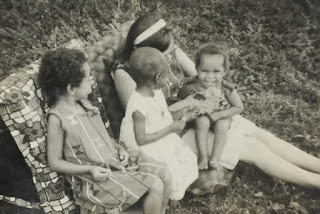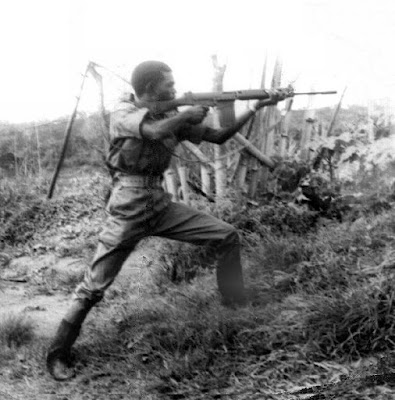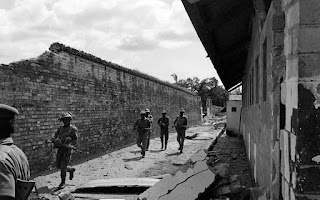Gosport Grandmother Recalls Fleeing The Horrors Of War In Nigeria
Leslie Mitchell with her daughters (l-r) Uche, Nnenna and Adaora in 1968. Image: Leslie Mitchell via The Portsmouth News
It may have happened more than 50 years ago, but Leslie Mitchell can still remember keenly the horrors she experienced in Nigeria after the county won its independence from Britain.
In a country ravaged by civil war, Leslie and her young family were forced to join the procession of thousands of refugees searching for safety amid shocking violence and hunger.
Along the way they picked up a desperately ill little girl who was simply abandoned by the side of the road.
And they watched in terror as people were set on fire by mobs for supporting the ‘wrong’ side in the war.
The breakaway republic of Biafra, in eastern Nigeria, where Leslie's husband Len was from, existed for just 30 months between 1967 and 1970.
However, the destruction that ensued wrought repercussions through the generations.
But how did Leslie end up there? From the comfort of her home in Gosport, where she has lived since 1985, the now-75-year-old, reveals what happened.
‘I was 18 years old and living in Dunfermline, Scotland, when the man I was to marry asked me for a dance at the Kinema Ballroom.
‘Two years later my career plan to qualify as a nurse was over. My matron simply refused to allow me to continue my training if I married Len.’
Astonishingly, the matron made no secret of her anger at Leslie’s decision to marry a black man. She even requested a meeting with Leslie’s mother and made her feelings clear to her too.
Against this backdrop of outrage towards mixed race relationships, the couple defied the racists and married when Leslie was just 19.
Months later they had their first child, Ucha, and were sailing, second class, to Nigeria for a new life together, unaware of the difficulties they would face.
‘Our first home was in the capital, Lagos, and was a big culture shock to Len and I’, says Leslie.
‘The newly independent west African country was already experiencing political and civil unrest, leading to violence, massacres, coups, and the inability of the central government to control the situation.
‘Hundreds of thousands of easterners who had settled throughout the whole of the country now went home as they had become the targets of slaughtering mobs.
‘The secession of the eastern region, calling itself Biafra, followed and a David and Goliath bitter conflict ensued.
‘The word kwashiorkor – meaning severe malnourishment – and pictures of starving children and adults appeared in the Western press for the first time.
‘I was one of around a dozen, mainly British, foreign wives of Biafrans who remained with their husband throughout the civil war.'
Len – who Leslie divorced in 1996 – was a mechanical engineer in the Nigerian Navy when they first met.
But when he returned to Nigeria he did not spend long in the forces and would regularly change jobs.
It made it difficult for Leslie to keep her family’s heads above water. She also found it hard, as a foreigner, to find work.
She says: ‘I worked voluntarily with relief agencies in feeding centres, clinics, an orphanage and, after Biafra surrendered in January 1970, in a children’s hospital in return for food for my growing family.’
Leslie adds: ‘It gave me a qualification in survival no university could have imparted. Without electricity, gas, petrol or phones, and often without money, medicine or safe drinking water we learned to appreciate the basic necessities of life.’
At a moment’s notice the family were forced to pack up all their worldly possessions and move on to new towns when things got too dangerous.
At one point they fled on an overcrowded barge from their island home in the Niger delta.
But one of the most distressing incidents came when they were fleeing and spotted a little girl at the side of the road, completely alone.
‘Abandoned children were everywhere’, says Leslie. ‘They had either become separated from their parents in the panic or they simply could not take them.
‘This little girl was about four years old but it was difficult to tell because she was very, very small.
‘We had seen her from time to time eating with a young couple but one day they just drove off on a motorbike and left her there.
‘She was filthy, she could barely stand, her legs were swollen and seeping fluid. Her tummy was swollen and her hair was sparse and dirty grey.’
In what Leslie describes as a ‘miracle’ water started running from a pump which had been empty until then. The couple cleaned up Nnenna and took her with them.
That little girl is now 50 and Leslie beams with pride as she says: ‘We consider her our daughter. The year before last I went to her daughter's graduation.’
In 1970 the whole family, including Ucha, Adaora and only son Emeka, moved to Lagos where Leslie became a member of Nigerwives, an organisation for foreign wives and partners of Nigerians, which was a huge support.
By the 1980s her marriage was all but over and in her forties she moved to Gosport with Emeka to be close to her sister. Her other children followed and she started again, with nothing, and eventually became a senior social worker.
‘I was fortunate to have good friends, old and new, to support and encourage me as we put down roots gaining the security which had been lacking in our lives’, she says. ‘The motto of Gosport, “God's Port Our Haven” has certainly been apt for us.’
It may have happened more than 50 years ago, but Leslie Mitchell can still remember keenly the horrors she experienced in Nigeria after the county won its independence from Britain.
In a country ravaged by civil war, Leslie and her young family were forced to join the procession of thousands of refugees searching for safety amid shocking violence and hunger.
Along the way they picked up a desperately ill little girl who was simply abandoned by the side of the road.
And they watched in terror as people were set on fire by mobs for supporting the ‘wrong’ side in the war.
The breakaway republic of Biafra, in eastern Nigeria, where Leslie's husband Len was from, existed for just 30 months between 1967 and 1970.
However, the destruction that ensued wrought repercussions through the generations.
But how did Leslie end up there? From the comfort of her home in Gosport, where she has lived since 1985, the now-75-year-old, reveals what happened.
‘I was 18 years old and living in Dunfermline, Scotland, when the man I was to marry asked me for a dance at the Kinema Ballroom.
‘Two years later my career plan to qualify as a nurse was over. My matron simply refused to allow me to continue my training if I married Len.’
Astonishingly, the matron made no secret of her anger at Leslie’s decision to marry a black man. She even requested a meeting with Leslie’s mother and made her feelings clear to her too.
Against this backdrop of outrage towards mixed race relationships, the couple defied the racists and married when Leslie was just 19.
Months later they had their first child, Ucha, and were sailing, second class, to Nigeria for a new life together, unaware of the difficulties they would face.
‘Our first home was in the capital, Lagos, and was a big culture shock to Len and I’, says Leslie.
‘The newly independent west African country was already experiencing political and civil unrest, leading to violence, massacres, coups, and the inability of the central government to control the situation.
‘Hundreds of thousands of easterners who had settled throughout the whole of the country now went home as they had become the targets of slaughtering mobs.
‘The secession of the eastern region, calling itself Biafra, followed and a David and Goliath bitter conflict ensued.
‘The word kwashiorkor – meaning severe malnourishment – and pictures of starving children and adults appeared in the Western press for the first time.
‘I was one of around a dozen, mainly British, foreign wives of Biafrans who remained with their husband throughout the civil war.'
Len – who Leslie divorced in 1996 – was a mechanical engineer in the Nigerian Navy when they first met.
But when he returned to Nigeria he did not spend long in the forces and would regularly change jobs.
It made it difficult for Leslie to keep her family’s heads above water. She also found it hard, as a foreigner, to find work.
She says: ‘I worked voluntarily with relief agencies in feeding centres, clinics, an orphanage and, after Biafra surrendered in January 1970, in a children’s hospital in return for food for my growing family.’
Leslie adds: ‘It gave me a qualification in survival no university could have imparted. Without electricity, gas, petrol or phones, and often without money, medicine or safe drinking water we learned to appreciate the basic necessities of life.’
At a moment’s notice the family were forced to pack up all their worldly possessions and move on to new towns when things got too dangerous.
At one point they fled on an overcrowded barge from their island home in the Niger delta.
But one of the most distressing incidents came when they were fleeing and spotted a little girl at the side of the road, completely alone.
‘Abandoned children were everywhere’, says Leslie. ‘They had either become separated from their parents in the panic or they simply could not take them.
‘This little girl was about four years old but it was difficult to tell because she was very, very small.
‘We had seen her from time to time eating with a young couple but one day they just drove off on a motorbike and left her there.
‘She was filthy, she could barely stand, her legs were swollen and seeping fluid. Her tummy was swollen and her hair was sparse and dirty grey.’
In what Leslie describes as a ‘miracle’ water started running from a pump which had been empty until then. The couple cleaned up Nnenna and took her with them.
That little girl is now 50 and Leslie beams with pride as she says: ‘We consider her our daughter. The year before last I went to her daughter's graduation.’
In 1970 the whole family, including Ucha, Adaora and only son Emeka, moved to Lagos where Leslie became a member of Nigerwives, an organisation for foreign wives and partners of Nigerians, which was a huge support.
By the 1980s her marriage was all but over and in her forties she moved to Gosport with Emeka to be close to her sister. Her other children followed and she started again, with nothing, and eventually became a senior social worker.
‘I was fortunate to have good friends, old and new, to support and encourage me as we put down roots gaining the security which had been lacking in our lives’, she says. ‘The motto of Gosport, “God's Port Our Haven” has certainly been apt for us.’




Comments